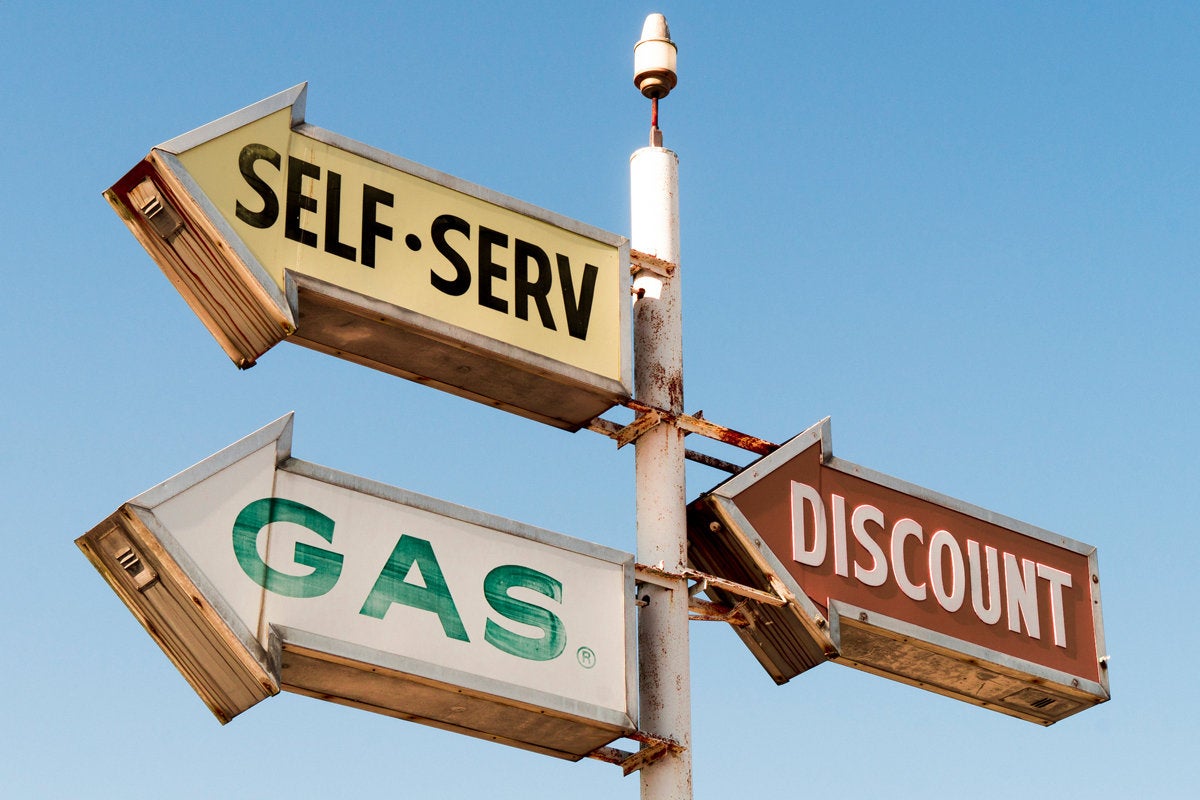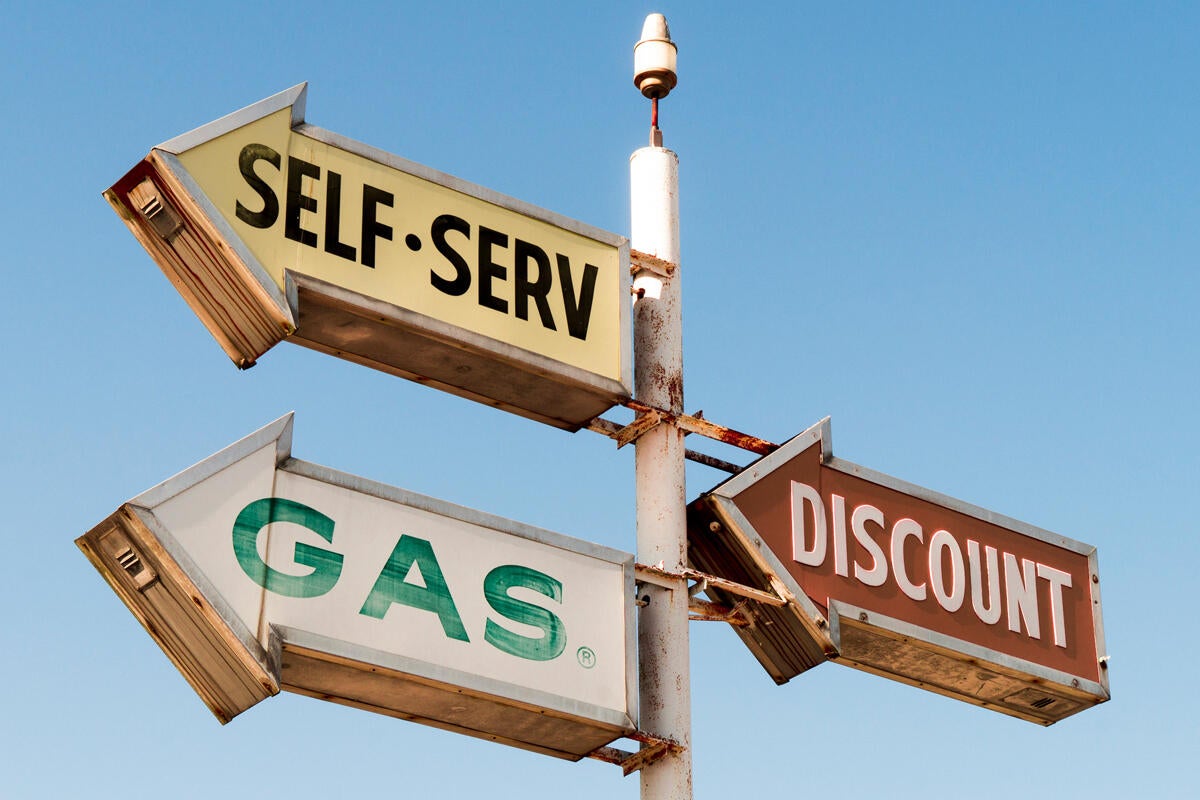
COVID-19, and the desire to avoid getting it, is already impacting mobile payments, especially NFC payments known as contactless. Those payments happen in-store, mere inches away from the same card swipe device used by countless others. But shoppers’ desire to avoid going inside stores at all, even briefly, is sparking interest in app payments that happen far away from a POS system.
Case in point: 7-Eleven. Although 7-Eleven is piloting a program to accelerate in-store purchases by scanning barcodes, that’s not especially COVID-19-friendly. The more interesting trial from the Slurpee people is aimed at paying for gas and it theoretically eliminates having to talk with a store employee at all. (If I keep the windows closed throughout the interaction, am I supposed to still wear the mask?)
This trial is not being done in New Jersey, which is ironic because that is the only current state that forbids self-service, which would make this app effort entirely COVID friendly. Everywhere else – including where the app is initially being trialed, namely parts of Florida, Texas and Virginia – you still typically need to exit the vehicle and pump gas, using the same pump everyone else is using. Unless everyone else is using one-time-use plastic gloves (highly unlikely), then the pump is a potential source of infection. Still, if you use a pair of disposable gloves (and then indeed throw them out immediately before you re-enter your vehicle and touch your phone), this app helps minimize exposure.
How will it theoretically work? This is how 7-Eleven describes it.
“To pay via the 7Rewards loyalty program in the 7-Eleven app, simply upgrade the 7-Eleven app to the most current version and set up a credit or debit card under payment in account settings. The app also accepts Google Pay or Apple Pay. Customers select their fuel pump number and choose a preferred fuel amount. To complete the purchase, simply authorize the payment through the app. To set up the Siri experience on iPhones, simply create a Siri shortcut in the most up to date 7-Eleven app. On the payment confirmation screen of the fuel loyalty program, customers will be prompted to set up a customized Siri shortcut that they can use at the pump. Once set up, customers won’t have to open their app during future visits to get the fuel rewards or pay. Instead they simply instruct Siri using their new shortcut to select a pump and authorize payment.”
The addition of a Siri shortcut – which, obviously, is not an option for Android devices – is a nice touch. But this does raise the question of speed. Let’s face it: We Americans are a proudly lazy people. So why not attach RFID tags to each pump and allow the app to query the pump for the pump number and store location? By opting for the customer’s default payment, that merely leaves the question of “How much fuel do you want?” which, as the statement noted, is simply “fill it up” or “Give me XX dollars worth of gas.”
By the way, to nitpick a little, 7-Eleven described this as “contactless payment.” It’s not. At least that’s not how contactless payment is used in the payments space. It typically refers to NFC (rarely, it can also refer to an RFID payment). They could have called this non-touch or any one of a million other phrases, but contactless already has a meaning and this isn’t it.
Forrester retail analyst Sucharita Kodali took exception to this 7-Eleven trial being positioned as a COVID-19 measure. To be fair, 7-Eleven’s statement announcing the trial didn’t mention COVID and it was various media reports – including, I suppose, this one – that linked it to Corona.
Kodali tweeted about the 7-Eleven trial and said: “Am I the only one confused by what problem they are trying to solve? You still have to handle a communal gas pump to fill your car, which is kind of the main part of the experience.” In an interview, Kodali added that the pump interaction – and she doubts most people think to use disposable or any other kind of glove – makes this rather pointless. “That’s why this is stupid. Unless you have a robot pumping your gas, you haven’t fixed the issue.
“I don’t know that finance has done the full analysis. These are solutions looking for problems,” Kodali said. “This is the solution that they can build versus the solution that they need. The solution that they need (paying associates to pump the gas for customers everywhere) is far too expensive.”
As for time savings, Kodali said the app might make more sense if the purchase could be handled entirely ahead of time. In other words, if shoppers could sit back at home, decide they need to fill up the car and then completely fill out the app then and there. That would shorten the time spent at the gas station. But given that the app needs to know the number of the pump, it blocks doing it ahead of time.
Even though Kodali is a superb analyst whom I have tracked for a ludicrously long time, I’m not fully on board with her skepticism this time. Although it’s not perfect, 7-Eleven’s effort does materially reduce a customer’s COVID exposure – reducing all of the payment interaction risks –and it’s creating a better situation than existed before. Adhering to the cliché of not rejecting the good in search of the perfect, this seems a distinct improvement.
I, for one, would be quite happy to no longer having to wipe down my payment card with an alcohol wipe every time it is swiped or dipped. (Maybe that’s overkill but I’ve lost relatives and neighbors to COVID and my wife encourages overkill.)



